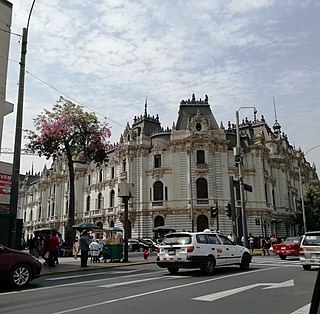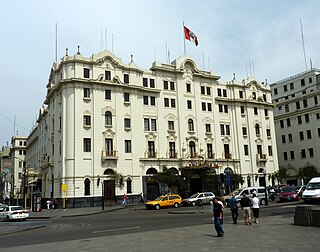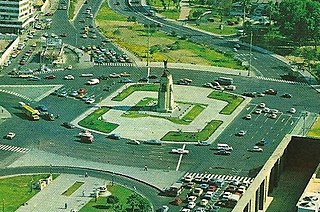
Barranco is one of 43 districts in Lima, Peru. Its current mayor is Jessica Vargas.

Rímac, known until the 19th century as the neighbourhood of San Lázaro, is a district in the Lima Province, Peru. It lies directly to the north of downtown Lima, to which it is connected by six bridges over the Rímac River. The district also borders the Independencia, San Martín de Porres, and San Juan de Lurigancho districts. Vestiges of Lima's colonial heyday remain today in an area of the Rímac district known as the Historic centre of Lima, which was declared a UNESCO World Heritage Site in 1988. Downtown Rímac District has, like its southern counterpart, its eastern and western sides divided by Jirón Trujillo, which connects to Lima District's Jirón de la Unión through the Puente de Piedra, the oldest bridge in the whole city. Rímac's East side features the Plaza de Acho, the most famous bullfighting arena in South America and one of the most well known in the world.

The Plaza de Torosde Acho is the premier bullring in Lima, Peru. Located beside the historical center of the Rímac District, the plaza is classified as a national historic monument. It is the oldest bullring in the Americas and the second-oldest in the world after La Maestranza in Spain. It opened on 30 January 1766.

The Jirón de la Unión, or Union Street, is a pedestrian street located in the Historic Centre of Lima, part of the capital of Peru. For many decades it was the most important boulevards of the city, often described as the most aristocratic, where many of the most affluent citizens of the city and most powerful men around the world would meet. Subsequently, with the deterioration of the center of Lima, the Jirón de la Unión lost its aristocratic character and became completely commercialized.

The Archbishop's Palace of Lima, the capital of Peru, is the residence of the Archbishop of Lima, and the administrative headquarters of the Archdiocese of Lima. It is located on the Plaza Mayor of Lima, in the Historic Centre of Lima.

The Plaza Mayor de Lima, or Plaza de Armas de Lima, is considered one of the birthplaces of the city of Lima, as well as the core of the city. Located in the Historic Centre of Lima, it is surrounded by the Government Palace, Lima Metropolitan Cathedral, Archbishop's Palace of Lima, the Municipal Palace, and the Palacio de la Unión.

The Plaza San Martín is one of the most representative public spaces of the city of Lima, Peru. It is located at the ninth block of Colmena avenue, within the Historic Centre of Lima which was declared a World Heritage Site in 1988 by UNESCO. It is located near the Plaza Mayor of Lima and is connected to it by the Jiron de la Union. Its central monument gives homage to Peru's liberator, José de San Martín.

The Palacio Municipal de Lima or City Hall of Lima is a public building that serves as headquarters of the Metropolitan Municipality of Lima. It is located on the street Portal de Escribanos, block 3 of Jirón de la Unión, and in front of the Plaza Mayor of Lima's historic centre.

The Gran Hotel Bolívar, is a historic hotel located on Plaza San Martín in Lima, Peru. Designed by noted Peruvian architect Rafael Marquina, it was built in 1924 and was the first large, modern hotel built in Lima.

Escuela Nacional Superior Autónoma de Bellas Artes del Perú (ENSABAP) is a fine arts school in Lima, Peru. It is located in Barrios Altos, a suburb of Lima District. It was founded in 1918, by President José Pardo y Barreda and Peruvian painter Daniel Hernández, who was its first director. It is located in a monumental building built in the early 1940s.

The Plaza Bolognesi is a roundabout located in the Lima District and the Breña District, in the capital of Peru. It is located at the intersection of Brazil Avenue, Arica Avenue, Alfonso Ugarte Avenue, Guzmán Blanco Avenue, and 9 December Avenue.

The Plaza Grau is a public square located in the center of Lima, Peru. It is located at the intersection of the Paseo de la República with the Paseo Colón, Miguel Grau Avenue and the Paseo de los Héroes Navales. It was named in honor of Miguel Grau Seminario, commander of the Huáscar monitor during the War of the Pacific.

The Plaza Manco Cápac, formerly the Plaza Leguía, is a public square in Lima. Formerly named after president Augusto B. Leguía, its current name comes from Manco Cápac, the first Sapa Inca of Cuzco.

The Statue of Liberty is a bronze sculpture located in the Plaza Francia of the historic centre of Lima, Peru. It was made in 1926 according to the design of the French sculptor René Bertrand-Boutée and cast by Eugène Soleau. It is a one-piece bronze sculpture about 2 metres high and represents a standing female figure, dressed in a light tunic and with a laurel wreath on her head. This is installed on a 4.30 m high pedestal. The sculpture and the Plaza Francia were declared a monumental urban environment in 1972. In 2018, La Libertad was declared Cultural Heritage of the Nation.

Democracy Square is a public square in the Historic Centre of Lima, Peru. It is located on the former site of the Bank of the Nation Building, which burned down in the year 2000 during the Four Quarters March. The park's address is 1045 Nicolás de Piérola Avenue.

Peru Square, formerly known as Francisco Pizarro Small Square, is a public square located in central Lima, Peru.

Italy Square, formerly known as Saint Anne's Square, is a public square in the Barrios Altos neighbourhood of Lima, Peru. It was the second square built by the Spanish during the colonial era and later served as one of the four squares where the independence of Peru was declared in the city.

Theatre Square is a public square located next to the Teatro Segura in the second block of Jirón Huancavelica, part of the historic centre of Lima, Peru.

Ramón Castilla Square, formerly known as Union Square, is a public square in the historic centre of Lima, Peru. It is one of three squares through which Alfonso Ugarte Avenue passes—the others being Dos de Mayo and Bolognesi—and is also located at the intersection of Argentina and Emancipación avenues. It is named after former president Ramón Castilla.

The Plaza Francia, also known by its former name, Plazoleta de la Recoleta, is a public square in the historic centre of Lima, Peru.




















